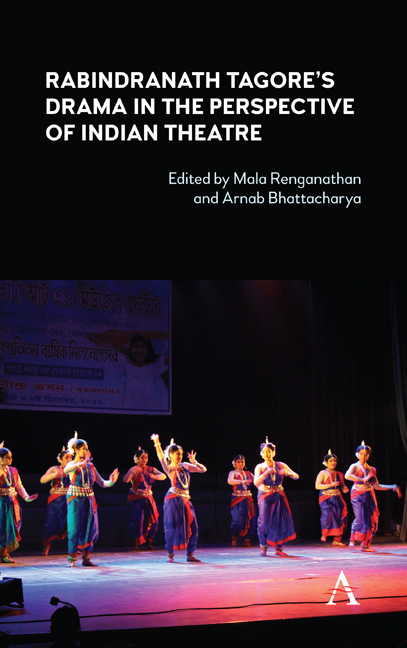Chapter 4 - Tagore’s Artistic Rendering of Spiritual Realism in Dak Ghar
Published online by Cambridge University Press: 20 January 2022
Summary
Rabindranath Tagore (1861–1941, referred to as Gurudev) continues to be relevant even today as a poet, novelist, playwright, activist, educationist, composer and a painter. Gurudev's Upanishadic vision, that all creation is ‘one’, lies at the core of all his creative activities. Particularly as a dramatist, Tagore has a distinct place in the history of Bengali drama. He successfully blended the elements of the folk drama of Bengal with classical Sanskrit drama. Tagore's range in drama has been varied from symbolical plays, allegories, dance dramas, verse plays, poetic dramas and comedies. Apart from his plays, Tagore's short stories and novels have been dramatized and a few have been adapted into films that remain very popular including The Post Master, Home and the World, Nashto Nid, Kabuliwala and Strir Patra.
Although only a few plays of Tagore (about 15) out of a total of around 60 plays are staged and reproduced, they all enrich immensely the repertoire of Bengali literature to which other Bengali stalwarts such as Michael Madhusudan Dutt, Khirode Prasad Vidyavinod, Kali Pranna Singha, Bankim Chandra Chatterjee, Sarat Chandra Chatterjee and Nirupama Debi also contributed.
Tagore was a gifted dramatic genius. His imagination and poetic instincts were disparate from the Western thought and principle followed by the Greek dramatists like Sophocles, Aeschylus and Euripides. He did not use the Aristotelian lens to view a tragedy, because Indian ethos looked upon life as an integrated whole wherein pity and fear form a segment only. A rich blend of his outstanding poetry and imaginative depth come together in shaping Tagore's theatrical form, working like a magically woven spell where it becomes impossible to trace or sift elements singularly. Tagore's plays attempt to achieve no ‘catharsis’. Rather, Abhinavgupta's Rasa theory, according to which each and every rasa is responsible for the effect it creates over life, is relevant to understand Tagore's drama. Gurudev's plays move around the mystery of human experience.
Further, his plays hold a consolidated cosmic vision of the entire shristi or universe, which cannot be seen in isolation of a particular time, place or action. The dramas are based on the Upanishadic teachings that inspired Gurudev and were instilled in him since his childhood.
- Type
- Chapter
- Information
- Publisher: Anthem PressPrint publication year: 2020



